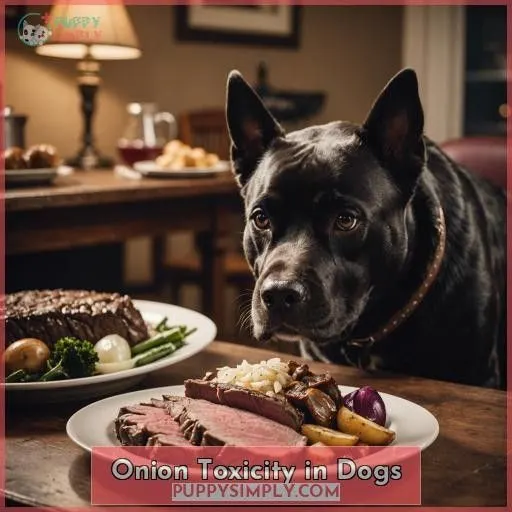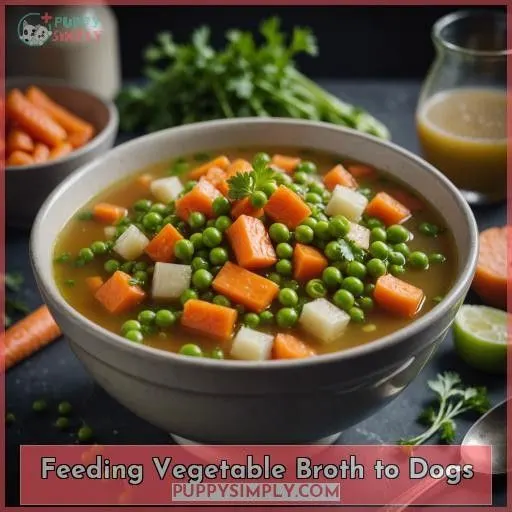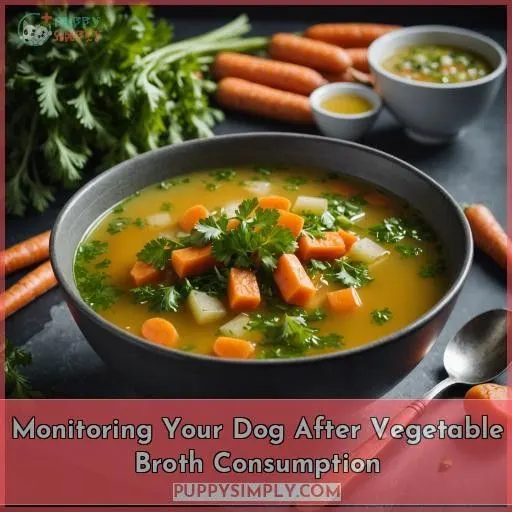This site is supported by our readers. We may earn a commission, at no cost to you, if you purchase through links.

Avoid broths containing onions, garlic, or excessive salt which can be toxic. Check ingredient lists for dog-safe veggies and opt for low-sodium varieties.
Go easy on portions and monitor for any digestive issues. The benefits include enhanced immunity, healthy skin, and coat.
To feed safely, consider portion control and keep an eye out for signs of upset.
Table Of Contents
- Key Takeaways
- Can Dogs Eat Vegetable Broth?
- Can Dogs Have Vegetable Broth?
- Onion Toxicity in Dogs
- 5 Best Vegetable Broths for Dogs
- Choosing a Dog-Safe Vegetable Broth
- Feeding Vegetable Broth to Dogs
- Monitoring Your Dog After Vegetable Broth Consumption
- Canine Digestive Health Benefits
- Making Homemade Vegetable Broth for Dogs
- Alternatives to Vegetable Broth
- Consulting Your Veterinarian About Broth
- Frequently Asked Questions (FAQs)
- Conclusion
Key Takeaways
- Vegetable broth can provide benefits for dogs, such as aiding digestion, enhancing immunity, and promoting healthy skin and coat, but certain ingredients like onions and excessive sodium can pose risks.
- When selecting a vegetable broth for dogs, it’s important to check the ingredient list, opt for low-sodium varieties, and monitor portion sizes to avoid digestive issues.
- Homemade vegetable broth can be a safe and nutritious option, as long as it’s made with dog-friendly vegetables and cooked properly.
- Consulting a veterinarian is recommended before introducing vegetable broth or any new food item to a dog’s diet, especially for those with underlying health conditions or dietary restrictions.
Can Dogs Eat Vegetable Broth?
Yes, dogs can safely consume vegetable broth in moderation. Vegetable broth can provide some health benefits for dogs, but it’s important to avoid broths containing onions or high sodium levels, which can be harmful to canine health.
Can Dogs Have Vegetable Broth?
You might be wondering if vegetable broth is a safe and beneficial addition to your dog’s diet. While it can provide hydration and some nutrients, certain ingredients like onions and excessive sodium can pose risks, so it’s important to choose dog-safe varieties and monitor portion sizes.
Is Vegetable Broth Safe for Dogs?
Absolutely, vegetable broth is generally safe for dogs. However, avoid broths containing onions, garlic, or excessive salt. To be safe:
- Check ingredient lists for dog-safe veggies
- Go easy on portions, especially for small breeds
- Opt for low-sodium varieties or make your own
- Monitor for digestive issues like vomiting or diarrhea
With some precautions, your pup can enjoy the occasional sip of veggie broth as a tasty, hydrating treat.
Benefits of Vegetable Broth for Dogs
Feeding your pup veggie broth provides nutritional benefits, aiding joint health with vitamins and minerals. It can support digestion, enhance immunity with antioxidants, and even promote healthy skin and coat. Numerous pre-prepared beef broths are suitable for dogs, simplifying consumption. Gradually introduce broth for the best digestive support and enjoyment.
Risks of Feeding Dogs Vegetable Broth
While vegetable broth offers benefits, you should be cautious when feeding it to dogs. Some store-bought varieties contain onions, garlic powder, or high sodium levels that can lead to:
- Heinz body formation and anemia
- GI upset like vomiting and diarrhea
- Dehydration and electrolyte imbalances
Instead, opt for low-sodium, onion-free broths or consider bone broth, which provides additional nutritional advantages for your furry companion.
Onion Toxicity in Dogs
Onion toxicity in dogs can cause severe symptoms like vomiting, lethargy, pale gums, rapid breathing and heart rate, and reddish-brown urine. If you suspect your dog has eaten onions, it’s critical to seek immediate veterinary attention, as this condition requires prompt treatment to prevent life-threatening complications.
Symptoms of Onion Toxicity
If your dog accidentally consumes vegetable broth containing onions, watch out for symptoms like vomiting, loss of appetite, weakness, pale gums, and rapid breathing. These signs indicate onion toxicity, which can lead to Heinz body formation and hemolytic anemia. Don’t panic – just keep a close eye on your pup and seek veterinary attention if GI upset persists.
| Symptom | Severity | Timeframe |
|---|---|---|
| Vomiting | Mild to Severe | 1-2 days |
| Loss of Appetite | Moderate to Severe | 1-3 days |
| Weakness | Moderate | 1-3 days |
| Pale Gums | Moderate | 1-3 days |
| Rapid Breathing | Moderate | 1-2 days |
Treatment for Onion Poisoning
If your dog has consumed onions, immediate veterinary attention is essential. Your veterinarian may induce vomiting to expel the toxins, administer activated charcoal, and provide supportive measures such as intravenous fluids and oxygen therapy. Grave cases may necessitate blood transfusions. With prompt treatment, most dogs recuperate; however, prevention is paramount – maintain onions out of reach of your pet.
5 Best Vegetable Broths for Dogs
In selecting a vegetable broth for your canine companion, contemplate options such as:
Brutus Broth Beef Flavor Dog Food Topper
Solid Gold Beef Bone Broth Turmeric Dog Topper
Organic Chicken Bone Broth Powder Topper
Merrick Chicken Bone Broth Wet Dog Food
Brutus Beef Bone Broth for Dogs & Cats
These broths are meticulously crafted for canine consumption, delivering essential nutrients while avoiding potentially harmful components.
1. Brutus Broth Beef Flavor Dog Food Topper
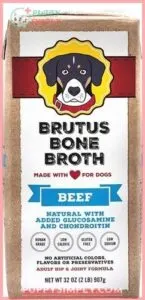
Brutus Broth Beef Flavor Dog Food Topper is an exceptional option for enhancing your pup’s meals with nutritional value.
Crafted with 100% human-grade ingredients, this broth is devoid of synthetic additives and enriched with advantageous nutrients like glucosamine and chondroitin to bolster joint health.
The beef flavor is irresistible, catering to even the most finicky canines, while the turmeric aids in reducing inflammation.
Simply drizzle a small amount over your dog’s usual meal to offer a delectable, hydrating treat that fosters their overall well-being.
With its premium formulation and glowing reviews, Brutus Broth stands as a preeminent option for discerning dog owners.
Best For: Discerning dog owners prioritizing their pup’s joint health and overall well-being.
- Made with 100% human-grade ingredients and free from artificial additives
- Enriched with glucosamine and chondroitin for enhanced joint health
- Easy to use as a meal topper or rehydrating agent
- May not be suitable for dogs with allergies to beef or other ingredients
- Price may be higher than some other dog food toppers
- Not a complete and balanced diet on its own
2. Solid Gold Beef Bone Broth Turmeric Dog Topper
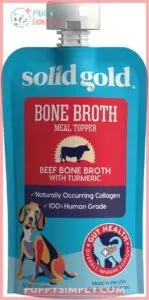
You’ll also want to think about the Solid Gold Beef Bone Broth Turmeric Dog Topper.
It’s a nourishing beef bone broth infused with turmeric, known for its anti-inflammatory properties.
This broth can support your pup’s joint health and mobility.
Plus, it’s grain-free and packed with collagen for a healthy coat and skin.
Just shake it up and pour it over your dog’s regular food for an extra boost of hydration and nutrition.
Best For: Dogs with sensitive digestion, joint issues, or who need a nutritional boost.
- Rich in collagen for healthy skin, nails, and joints
- Grain-free, gluten-free, and no corn, wheat, or soy
- Perfect little addition to kibble
- Some dogs may not like it
- May cause excessive scratching in some dogs
- Refrigeration required after opening
3. Organic Chicken Bone Broth Powder Topper
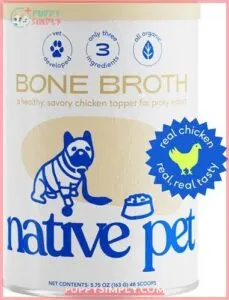
The Organic Chicken Bone Broth Powder Topper is a paw-some addition to your pup’s diet.
Created by pet nutritionists, this all-natural powder is packed with collagen, amino acids, and other nourishing ingredients to keep your canine companion hydrated and healthy.
Even the pickiest eaters will gobble it up, thanks to its delectable chicken flavor.
Simply sprinkle it on your dog’s food or mix it into their water for a boost of protein and other essential nutrients.
With its limited ingredient list and lack of fillers, this powder topper is a great choice for dogs with sensitive stomachs or special dietary needs.
Best For: Dogs of all ages and breeds with sensitive stomachs or special dietary needs.
- All-natural and organic ingredients
- Packed with collagen and amino acids
- Easy to use as a topper or in water
- Small amount of product in the container
- May not be suitable for cats
- Some reviewers have complained about the price
4. Merrick Chicken Bone Broth Wet Dog Food
Merrick’s Chicken Bone Broth Wet Dog Food is a nourishing option that can add moisture and flavor to your pup’s meals.
Made with real chicken bone broth, this wet food topper is packed with protein, collagen, and essential nutrients to support your dog’s overall health.
The broth is gently simmered to extract maximum benefits, and the formula is free of grains, fillers, and artificial ingredients.
Simply mix a spoonful into your dog’s regular food to entice them to eat and provide an extra boost of hydration and nutrition.
As with any new food, introduce it gradually to avoid digestive upset.
Best For: Dogs who need a flavorful and nutritious addition to their diet.
- Adds moisture and flavor to meals
- Packed with protein, collagen, and essential nutrients
- Free of grains, fillers, and artificial ingredients
- Some dogs may not like the taste
- May cause diarrhea in some dogs
- May need to be introduced gradually to avoid digestive upset
5. Brutus Beef Bone Broth for Dogs Cats
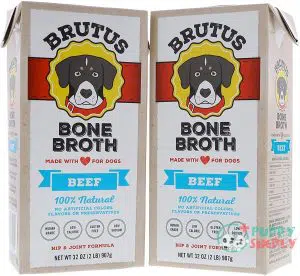
Brutus Beef Bone Broth for Dogs Cats is a high-quality option that can provide your canine companion with a nutritious boost.
Made with all-natural, human-grade ingredients, this broth is packed with beneficial nutrients like glucosamine and chondroitin to support joint health.
Plus, it’s low in sodium, making it a safe choice for dogs.
Simply add a splash to your pup’s food or serve it as a tasty treat – your dog is sure to love the big, beefy flavor.
Just be mindful of portion sizes, as too much broth can cause digestive upset.
With Brutus, you can feel good about giving your furry friend a delicious and wholesome supplement.
Best For: Dogs and cats, especially those with joint issues or digestive sensitivities.
- All-natural, human-grade ingredients
- Rich in glucosamine and chondroitin for joint health
- Low in sodium
- Pouring spout may leak when shaken
- Expensive to keep up with
- May not agree with all dogs’ stomachs
Choosing a Dog-Safe Vegetable Broth
When choosing a dog-safe vegetable broth, you’ll want to avoid those containing onions, garlic, or excessive amounts of sodium. Carefully examine the ingredient list and opt for low- or no-sodium varieties to minimize potential risks to your pup’s health.
Ingredients to Avoid
When choosing a dog-safe vegetable broth, be on the lookout for onion and garlic. Even a small amount can cause onion toxicity – vomiting, diarrhea, and potentially life-threatening anemia. Read labels carefully and skip any broth with these risky ingredients. Size matters too; stick to portion control to prevent sodium overload.
Sodium Content Considerations
When choosing a vegetable broth for your canine companion, pay close attention to the sodium content. Too much sodium can be harmful to your dog’s health, leading to issues like high blood pressure and fluid retention. Look for low-sodium or unsalted varieties that clock in under 140mg per serving. Your dog’s nutrition deserves the utmost care!
- Check the nutrition label for sodium content
- Opt for low-sodium or unsalted broths under 140mg per serving
- Moderation is key when feeding broth to maintain your dog’s health
Feeding Vegetable Broth to Dogs
Regarding vegetable broth, moderation is crucial.
For smaller canines, commence with mere spoonfuls daily.
While larger breeds might withstand up to 1/4 cup.
However, seek veterinary advice for tailored serving parameters.
Another option is freezing the broth in ice cube trays.
And utilizing the cubes as a revitalizing, low-calorie treat during sweltering days.
Or incorporating them into your dog’s regular diet for enhanced hydration and taste.
Serving Size Recommendations
Regarding vegetable broth for your canine companion, moderation is crucial. An appropriate daily serving typically ranges from 1-2 tablespoons for diminutive dogs, 1/4 to 1/2 cup for medium-sized dogs, and 1/2 to 1 cup for large breeds. Commence with modest portions and observe your pup’s response. Adjust the intake as necessary to maintain their comfort and well-being.
Creative Ways to Serve
- Freeze broth into ice cube trays for hydrating snacks.
- Mix broth into their regular food for an extra flavor boost.
- Use broth as a base for homemade dog food or bone broth-based soup.
Monitoring Your Dog After Vegetable Broth Consumption
After giving your dog vegetable broth, it’s essential to watch for signs of digestive problems, like vomiting, diarrhea, or sluggishness. If you see any worrying symptoms, get your pet to a vet right away, as some things in vegetable broths can be poisonous to dogs.
Signs of Digestive Distress
After giving your pup some vegetable broth, keep an eye out for signs of GI upset. Look for vomiting, diarrhea, lethargy, and appetite loss. Use this handy table to monitor their symptoms:
| Symptom | Mild | Moderate | Severe |
|---|---|---|---|
| Vomiting | 1-2 times | 3-5 times | 6+ times |
| Diarrhea | Soft stool | Watery stool | Bloody stool |
| Lethargy | Slightly less active | Reluctant to move | Unresponsive |
| Appetite | Eats a little less | Refuses meals | Complete loss |
If you notice any concerning changes, consult your veterinarian right away.
When to Seek Veterinary Care
You’ll want to seek veterinary care if your dog experiences severe vomiting, diarrhea lasting over 24 hours, bloody stool, extreme lethargy, or pale gums after ingesting vegetable broth.
Mild gastrointestinal upset can often be managed at home with Pepcid, a bland diet, and monitoring.
However, it’s better to consult your veterinarian proactively – they know your pup’s medical history and can advise if the broth poses any risks.
Prevention through avoiding toxic ingredients is best.
Canine Digestive Health Benefits
You’ll be pleased to know that feeding your dog vegetable broth can benefit their digestive health in several ways. The broth can aid nutrient absorption by providing a liquid base that helps break down and transport nutrients, while also supporting the growth of healthy gut flora, which is essential for overall digestive function.
Aids Nutrient Absorption
Vegetable broth can aid your dog’s nutrient absorption by providing a readily available source of vitamins, minerals, and other beneficial compounds. The liquid nature of broth helps break down and transport these nutrients more efficiently, supporting your pup’s overall digestive health and nutrient utilization. This can lead to improved energy, coat condition, and immune function.
Supports Healthy Gut Flora
Vegetable broth can also support your dog’s gut health by providing:
- Digestive enzymes that aid nutrient absorption
- Probiotic supplementation to promote a healthy microbiome
- Fiber content that regulates bowel movements and prevents constipation
Plus, the hydration benefits of broth can keep your pup’s digestive system running smoothly. Incorporate vegetable broth into their diet for a gut-friendly boost!
Making Homemade Vegetable Broth for Dogs
When making homemade vegetable broth for your dog, choose safe and nutritious veggie ingredients like carrots, celery, green beans, and spinach. Cook the veggies gently, strain out any solid pieces, and allow the broth to cool before refrigerating or freezing it in appropriate portions for your pup.
Dog-Safe Veggie Ingredients
When making homemade veggie broth for your pup, stick to dog-safe veggies like carrots, celery, sweet potatoes, and green beans. Avoid onions, garlic, and other alliums as they can be toxic. A simple broth with these wholesome ingredients provides vitamins, minerals, and antioxidants to support your dog’s health.
| Dog-Safe Veggies | Avoid |
|---|---|
| Carrots | Onions |
| Celery | Garlic |
| Sweet Potatoes | Leeks |
| Green Beans | Chives |
Cooking and Storage Tips
When making homemade vegetable broth for your pup, be sure to simmer the ingredients for at least 6-8 hours to extract maximum nutrients. Once cooled, you can freeze the broth in ice cube trays or airtight containers for up to 3 months. Just thaw and serve as needed, keeping an eye out for any spoilage.
Alternatives to Vegetable Broth
While vegetable broth offers nutritional value for dogs, bone broth and low-sodium chicken or beef broth can be excellent alternatives. Bone broths are rich in collagen, glucosamine, and minerals that support joint health, while low-sodium meat broths provide hydration and a flavor boost without the risks associated with onions or excess sodium.
Bone Broth Benefits
Bone broth is a fantastic alternative to vegetable broth for dogs. It’s packed with beneficial nutrients like collagen, gelatin, and amino acids that support joint health, digestion, and immune function. Plus, it’s highly digestible and easy on sensitive stomachs. Just be mindful of portion sizes and opt for low-sodium varieties when feeding bone broth to your pup.
Low-Sodium Chicken or Beef Broth
If vegetable broth isn’t your pup’s cup of tea, try low-sodium chicken or beef broth instead. These broths can aid nutrient absorption and support healthy gut flora, just be mindful of the sodium content. When making homemade, stick to dog-safe veggie ingredients and follow proper cooking and storage tips for a tasty, nutritious treat.
Consulting Your Veterinarian About Broth
While vegetable broth can be a tasty and nutritious addition to your dog’s diet, it’s always best to consult your veterinarian before making any changes. Your vet can provide personalized dietary recommendations based on your pup’s specific health needs and concerns. They may advise caution if your dog has:
- Underlying medical conditions like kidney or heart disease
- Food allergies or sensitivities
- Dietary restrictions due to medications or treatments
Your vet can also guide you on proper portion sizes and how to introduce vegetable broth gradually to monitor for any allergic reactions or digestive upset. With their expert advice, you can confidently incorporate this wholesome ingredient into your dog’s meals in a way that supports their overall wellbeing.
Frequently Asked Questions (FAQs)
What are the signs of onion toxicity in dogs?
Your dog’s appetite will vanish faster than a cheeseburger at a puppy party if he ingests onions! Watch for lethargy, vomiting, diarrhea, and pale gums – these are onion toxicity‘s sinister signs.
How much olive oil is safe for dogs to consume?
For healthy adult dogs, you can safely give up to a tablespoon of olive oil per day. Go easy at first and watch for loose stools.
What are the expert credentials of the veterinarian cited?
Dr. Linda’s a practicing vet with 30 years under her belt. She’s helped over 11,680 pet owners, specializes in dogs, and has a 6/10 rating from TrustPilot – verified by an independent service. That’s some serious cred right there!
What are the potential nutritional benefits of vegetable broth for dogs?
You’ll be glad to know that veggie broth offers your pup some key nutrients like vitamins A, C, K, plus minerals like potassium and magnesium.
How should vegetable broth be introduced into a dogs diet?
You’ll want to introduce veggie broth gradually, mixing it into your pup’s regular food. Start with small amounts and slowly increase, allowing their digestive system to adjust. Monitor for any adverse reactions and discontinue if issues arise.
Conclusion
Ultimately, can dogs eat vegetable broth? Yes, but with caution. By choosing low-sodium, dog-safe broths and monitoring portions, you can reap the digestive benefits while avoiding risks. Consult your vet for personalized advice, and consider homemade veggie broth for maximum control over ingredients. With moderation and vigilance, vegetable broth can be a nourishing addition to your pup’s diet.



